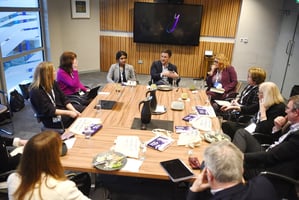Perlego is pleased to announce our successful application for the SUPC Framework tender, which saw...
5 Things We've Learned About Futureproofing MBAs
As modern technologies like artificial intelligence continue to emerge, MBA programmes face the challenge of preparing students with both the technical knowledge and interpersonal skills needed for employability in a rapidly evolving job market. Our recent webinar in partnership with Times Higher Education saw a panel of business school experts discuss how to futureproof programmes to ensure long term graduate success. Here are 5 things we learned:
%20(1)%20(1)%20(1)%202-1.jpg?width=3118&height=1754&name=Greg%20Keegan%20-%20Hult%20BBA%20Branding%202016-1936_CMYK%20(1)%20(1)%20(1)%20(1)%202-1.jpg)
- Soft Skills Remain Crucial: Despite the growing importance of technology, soft skills are still vital. Rafał Mrówka from SGH Warsaw School of Economics emphasized that the future of the MBA curriculum should focus on the proper use of technology in conjunction with soft skills like communication, critical thinking, and problem-solving. Nick Snowden from the University of Bradford echoed this sentiment, noting that the core skills taught in class will remain valuable even as specific content may become outdated.
- Integrating Technological Proficiency Is Key: With the rapid advancement of modern technologies like artificial intelligence (AI), MBA programmes must ensure graduates are well-versed in these tools. Martin Lukavec, programme leader at the London School of Business and Finance, highlighted the importance of asynchronous learning and alternative formats such as video lectures to enhance the value of MBA programmes. The goal is not just to teach technology but to show students how to use it effectively alongside traditional skills
- Emphasizing the Human Touch in the Age of AI: While AI may automate many tasks, the human element remains irreplaceable. Patti Brown, former senior executive director at HEC Paris, pointed out that empathy and people skills are essential, as MBA graduates will continue to work closely with others. This human touch is a constant, whether dealing with AI or other advanced technologies.
- Fostering Adaptability and Innovation: Wendy Loretto from the University of Edinburgh Business School identified adaptability, resilience, and innovation as critical skills for future MBA graduates. Leveraging AI to drive innovation will be crucial for maintaining employability and staying ahead in the business world. MBA programmes should thus encourage a mindset of continuous learning and adaptability.
- Utilizing AI for Curriculum Diversification: AI's role in business education goes beyond just teaching; it can also enhance how students access and use information. Luke Pennington from Perlego discussed the innovative use of AI-based search capabilities to diversify the curriculum. Features like deep search allow students to access a wide range of resources, moving beyond traditional linear reading lists to more inclusive and accessible content. This approach enables a richer, more flexible learning experience.
Overall, futureproofing MBA programmes involves a balanced integration of technological proficiency and essential soft skills, an emphasis on human interaction, fostering adaptability and innovation, and leveraging AI for diversified and inclusive learning resources. By focusing on these areas, MBA graduates can remain competitive and successful in the evolving business landscape.
The panel:
- Patti Brown, former senior executive director for academic affairs and programme delivery for MBA programmes, HEC Paris
- Wendy Loretto, dean, University of Edinburgh Business School
- Martin Lukavec, programme leader, London School of Business and Finance
- Rafał Mrówka, director of the MBA Programme Office, SGH Warsaw School of Economics
- Luke Pennington, regional sales lead, Perlego
- Sreethu Sajeev, branded content deputy editor, Times Higher Education (chair)
- Nick Snowden, director of MBA and digital learning, University of Bradford

.png?height=200&name=Standard%201080x1350%20(1).png)

